
Deep Brain
Stimulation Program
DBS Therapy Process
Each step requires multiple clinic visits and a significant time commitment. During this process, patients and family members will interact with many health care providers who all play essential roles in the patient's treatment.
The process lasts approximately six months and is described in detail below. The specific steps may be different for patients seeking DBS for other conditions, such as epilepsy, depression, or pain.
DBS Screening
DBS surgery is a procedure to treat motor symptoms that medications cannot control to improve quality of life. Therefore, it is essential to carefully evaluate patients before surgery to ensure they benefit from this complicated procedure.
The DBS screening process starts with a visit to a movement disorder neurologist with DBS expertise. If the patient is a good candidate, the neurologist will initiate a screening process that includes an overview of the entire DBS process, therapy goals, the surgery process and more. In many cases, patients may be asked to try medications if they have not been tried previously. All potential medical treatments must be tried before proceeding to surgery.
The DBS screening steps include video exam, motion analysis, neurocognitive evaluation, psychiatric evaluation, and brain MRI.
Video Exam
This is a clinic visit to document movement disorder symptoms on video. The recording will be used to determine if symptoms are likely to respond to DBS. After the surgery, this baseline recording will also be used to determine if stimulation is beneficial and if further adjustment of DBS settings is needed. Patients will fill out several questionnaires about mood and day-to-day function. Education about the entire DBS process will also be provided.
For patients with Parkinson's disease, it is important NOT to take any Parkinson's (PD) medications after 9 pm the day before this appointment (in other words, not take any PD medications for at least 12 hours prior to the exam). Patients need to bring their PD medications to the clinic so they can be evaluated both off and on medications (exam is repeated after medications start working).
Parkinson's (PD) medications include carbidopa/levodopa (Sinemet, Rytary, Duopa, Stalevo), pramipexole (Mirapex), ropinirole (Requip), apomorphine (Apokyn), rotigotine (Neupro patch), amantadine (Symmetrel), rasagiline (Azilect), selegiline (Eldepryl), entacapone (Comtan), trihexyphenidyl (Artane).
Long-acting pramipexole (Mirapex ER) and long-acting ropinirole (Requip XR) should be held for 24 hours prior to the video exam, meaning they should NOT be taken the night before the exam. All other Parkinson's medications should be held for 12 hours prior to exam; the Neupro patch should be removed at 9 pm. Other medications, including for high blood pressure, should be taken as prescribed. A light breakfast without protein (no meat, eggs, milk or cheese) is recommended so that levodopa absorbs faster in the clinic.
This visit lasts approximately 3 hours for Parkinson's disease and 1.5 hours for other conditions.
Location:
Movement disorders clinic
Brain Health Center, 5th Floor
12 Executive Park Dr.
Atlanta GA 30329
The contact number for this appointment is 404-778-3444
It is recommended to bring a family member, a caregiver or a friend to this appointment to assist the patient when off medications and so they can also learn about the DBS process.
Motion Analysis
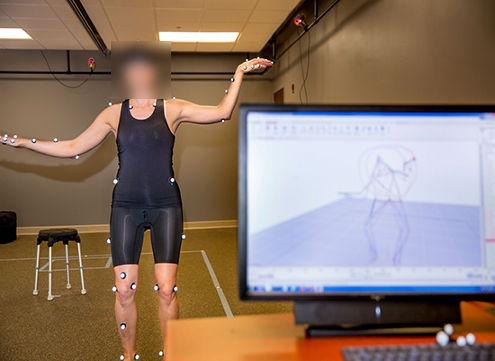
The motion analysis test objectively measures the severity of the motor symptoms using multiple body sensors. This provides in-depth understanding of abnormal movement patterns.
To perform the exam, the patient will need to change into a form-fitting tank top, shorts and a cap provided by the clinic. (There are multiple sizes available). About 60 small markers will be attached to the skin. It is important to NOT use any lotion on the day of the exam. During the exam, the patient will be asked to perform tasks similar to a regular clinic visit (walking, pointing, finger tapping, etc.).
For patients with Parkinson's disease (PD), it is important NOT to take any Parkinson's medications after 9 pm the day before this motion analysis appointment, in other words, do not take any PD medications for at least 12 hours prior to the exam (see detailed instructions under Video Exam section).
This visit lasts approximately 1 hour.
Location:
Movement disorders clinic
Brain Health Center, 5th floor
12 Executive Park Dr.
Atlanta GA 30329
The contact number for this appointment is 404-778-3444
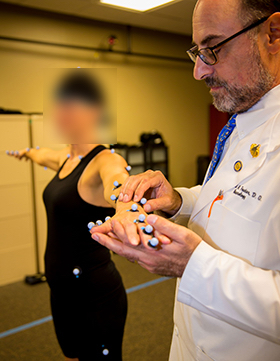
Neurocognitive Evaluation
Neurocognitive or neuropsychological assessment is a detailed test of memory, decision making and other mental skills. One of the possible DBS side effects is worsening of cognitive function so it is important to evaluate the level of risk a patient may be facing should they undergo surgery. Patients with dementia are typically not considered good DBS candidates. However, patients with less severe cognitive impairments may be recommended to undergo a staged surgery, where one brain lead is placed at a time to allow the brain time to recover or implant lead in an alternate area of the brain (globus pallidus versus subthalamic nucleus). Some cognitive issues may be reversible if they are caused by certain medications or depression. It is therefore important for the patient and family members to be frank about any potential cognitive problems and not attempt to hide these issues.
This visit lasts approximately 4 hours.
Location:
Neuropsychology clinic
Brain Health Center, 1st floor
12 Executive Park Dr.
Atlanta GA 30329
The contact number for this appointment is 404-778-3444
It is recommended to bring a family member, a caregiver or a friend who is familiar with the patient's day-to-day function to provide collateral information. All medications, including for Parkinson's disease, should be taken as usual.
Psychiatric Evaluation
Psychiatric symptoms such as depression and anxiety are common in patients with movement disorders. DBS can, in some cases, worsen mood so it is important to evaluate and treat any significant mood problems prior to surgery. Patients who are already under the care of an outside psychiatrist will still need to undergo this evaluation at Emory.
This visit lasts approximately 1 hour.
Location:
Geriatric Psychiatry clinic
Brain Health Center, 5th floor
12 Executive Park Dr.
Atlanta GA 30329
The contact number for this appointment is 404-778-3444
It is recommended to bring a family member, a caregiver or a friend who is familiar with the patient's day-to-day function to provide collateral information.
Brain MRI
The screening MRI scan of the brain is used to identify any potential problems that may interfere with performing DBS surgery. Patients who have had a brain MRI done within the last two years at an outside facility can bring/send images on a disk to be uploaded into the Emory system instead of repeating the scan (contact DBS coordinator to arrange).
This visit lasts approximately 45 minutes.
Location:
MRI
Brain Health Center, 1st floor
12 Executive Park Dr.
Atlanta GA 30329
The contact number for this appointment is 404-712-8485
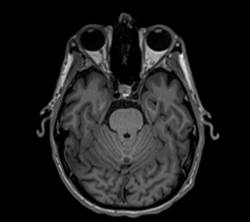
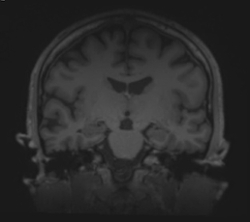
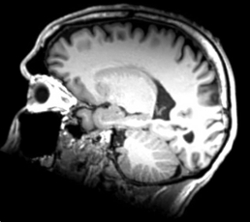
After DBS screening tests are completed, the patient's test results will be reviewed by the DBS clinic team to determine whether the patient should proceed with the surgery. The DBS clinic team consists of providers from Movement Disorder Neurology, Functional Neurosurgery, Neuropsychology and Psychiatry.
Pre - DBS Surgery
Neurosurgery Clinic Visit
After completing the DBS screening process, if the DBS clinic team recommends proceeding with DBS surgery, the next step is to meet with a functional neurosurgeon. The surgeon will verify the patient's overall health status is appropriate for surgery. If any additional evaluations are necessary, this will be discussed. Patients will be counseled again on different options regarding the surgery process (based on the patient's symptoms) and DBS hardware. Patient preferences will be taken into consideration along with medical factors. The surgeon will explain details of the surgical procedure, potential risks, and answer any questions the patient or their family may have.
This visit lasts approximately 1-2 hours.
Location:
Neurosurgery clinic
The Emory Clinic, building B, suite 2200
1365 Clifton Rd.
Atlanta GA 30322
The contact number for this appointment is 404-778-5770
Surgical Planning Imaging
A brain scan with contrast agent, which is given through an IV, will be performed to help with surgical target planning. This will be a MRI and/or CT scan. These scans will typically be scheduled for several weeks prior to surgery date.
This visit lasts approximately 1-2 hours.
Location: The location is MRI/CT scanner at either Clifton Road or Executive Park campus (confirm with radiology department when scheduling).
The contact number for this appointment is 404-712-8485
Pre-Operative Visit
Once the surgery date is agreed upon, a pre-operative visit will be scheduled for 1-2 weeks before the surgery date. Patient will meet with the anesthesia team. The medical history will be reviewed and blood will be drawn for pre-operative laboratory testing. The patient will also meet with a member of the surgery team to review and sign surgery consent.
In some cases, the patient may wear a customized framing device during the surgery so they will also have fiducial markers placed on the head during the pre-operative visit. Fiducial markers are screws that the surgeon places in the skull in order to hold the customized framing system. These fiducial markers need to be placed at least 7 days before the operation so that the customized system can be built. Local anesthetics will be given before the procedure and only a little bit of hair (a quarter size) will be clipped at each fiducial location. A CT scan will be done on the same day to confirm screw placement.
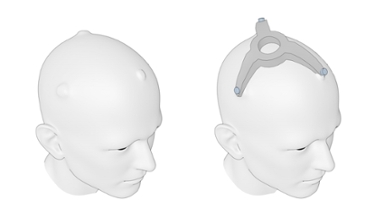
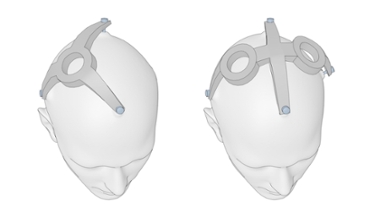
Customized fiducial markers will be placed on the patient's head several days before surgery.
Any blood-thinning medications (aspirin, clopidogrel (Plavix), warfarin (Coumadin), rivaroxaban (Xarelto), dabigatran (Pradaxa), apixaban (Eliquis), NSAID pain medications (ibuprofen (Motrin, Advil), naproxen (Aleve), fish oil, and vitamin E need to be stopped 7 days before surgery or as directed by the neurosurgeon/anesthesiologist.
This visit lasts approximately 5 hours (6-7 hours if fiducial markers are placed).
Location:
Neurosurgery clinic
The Emory Clinic, Building B, suite 2200
1365 Clifton Rd.
Atlanta GA 30322
The contact number for this appointment is 404-778-5770
DBS Surgery
DBS Surgery Part 1: Brain Lead Placement
DBS surgery is done in two parts about two weeks apart. During part 1, the brain leads are placed. The length of surgery varies, but 6-8 hours is typical. The procedure may be performed 'awake' or 'asleep' as described in the FAQ section. Patients typically stay at Emory University Hospital for 1 night and return home the following day.
Once at Emory University Hospital Clifton Road campus, take the A/B elevator to the third floor. Both the patient and the primary contact should check-in at the front desk.
The contact number for this appointment is 404-778-5770
Reminder for the morning of surgery:
- Brush your teeth
- Do not eat or drink anything
- Take only those medications that you were directed to take by your medical team, with little water. Parkinson's medications should not be taken unless instructed otherwise.
- Bring chlorhexidine wipe shower sticker
- Bring surgery information book
- If you are a woman, the surgery staff will collect your urine sample before the surgery.
- Your DBS home programmer, and charger if applicable, will be provided to your primary contact by the DBS vendor while you are in surgery. Please make sure your family is aware of this.
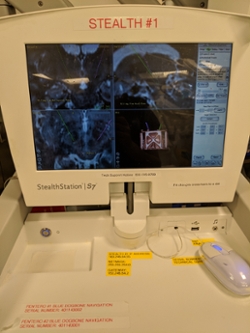
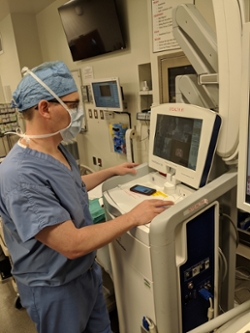
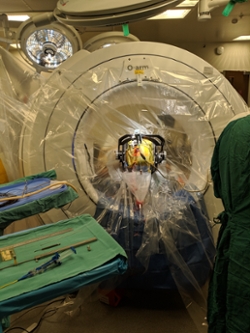
DBS Surgery Part 2: Battery Placement
During part 2 of the surgery, the DBS battery (or IPG) will be implanted and connected to the DBS leads. This surgery is performed under general or local anesthesia. Patients go home on the same day.
This length of surgery varies, but approximately 1-2 hours is typical.
At the Emory University Hospital Clifton Road campus, take the A/B elevator to the third floor. Both the patient and the primary contact should check-in at the front desk.
The contact number for this appointment is 404-778-5770
Reminder for the morning of surgery:
- Brush your teeth
- Do not eat or drink anything
- Take only those medications that you were directed to take by your medical team, with little water. Parkinson’s medications should not be taken unless instructed otherwise.
- Bring chlorhexidine wipe shower sticker
- Bring surgery information book
- If you are a woman, the surgery staff will collect your urine sample before the surgery.
- Your DBS home programmer, and charger if applicable, will be provided to your primary contact by the DBS vendor while you are in surgery. Please make sure your family is aware of this.
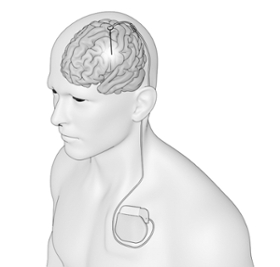
DBS battery (pulse generator or pacemaker) is typically placed in the upper chest, below the clavicle.
DBS Follow Up
Wound Check
Approximately two weeks after DBS battery implantation surgery, surgical wounds will be inspected by the neurosurgery clinic nurse practitioner to make sure they are healing well.
This visit lasts approximately 30 minutes.
Location:
Neurosurgery clinic
The Emory Clinic, Building B, suite 2200
1365 Clifton Rd.
Atlanta GA 30322
The contact number for this appointment is 404-778-5770
In most cases, you will see the surgeon, two months after surgery for another postop check.
Wound care instructions:
- Keep surgical site covered for three days
- If the surgical site is not covered with a sterile dressing, use the Polymyxin ointment that is provided to you. After the third day, remove the dressing and/or stop ointment use. Use soap and water to wash the site without directly hitting the surgical site with a water stream.
- Only use 50% hydrogen peroxide and water sparingly to loosen surgical prep and/or thick scabbing (no more than 2 times)
- Do not scrub or scratch the incision site
- Pat the area dry; do not rub
- Do not use conditioner for 1-2 weeks
- Avoid prolonged exposure to moisture, such as wearing wigs, sitting in a hot tub, or swimming for 4 weeks after your sutures/staples are removed. Limit the use of hats.
- Suture/staple removal in 2 weeks with a neurosurgery nurse practitioner
- If absorbable sutures, follow-up in 2-4 weeks for incisional check with a neurosurgery nurse practitioner
- If Dermabond, follow-up in 2-4 weeks for incisional check with a neurosurgery nurse practitioner
- Do not apply scar-reducing cream. Further hair washing instructions/hair coloring/hair cutting instructions will be provided at the wound check visit
Initial Programming
Initial programming visit when the DBS device is first activated is scheduled for 3-5 weeks after DBS lead placement. This time is necessary to allow the brain to heal. Some patients may notice that some of their movement disorder-related symptoms improve immediately after the surgery even before the stimulator is turned on. This is called a microlesioning effect and it can last for several days to weeks.
During the initial programming visit, the provider will go through all DBS lead contacts and check each for therapeutic benefit and side effects thresholds. This process is necessary to customize stimulation settings for each patient. The programming process typically requires several adjustments so symptoms may not improve at initial programming.
For patients with Parkinson's disease, it is important NOT to take any Parkinson's medications for 12 hours prior to DBS programming (see instructions under Video Exam). Patients need to bring their PD medications to clinic so they can be evaluated both off and on medications. Patients should also bring their DBS home programmer, and charger if applicable.
This visit lasts approximately 2-3 hours.
Location:
Movement disorders clinic
Brain Health Center, 5th floor
12 Executive Park Dr.
Atlanta GA 30329
The contact number for this appointment is 404-778-3444
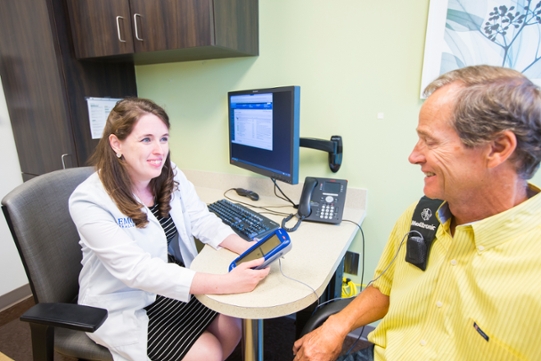
Follow-up Programming
Follow-up programming visits are scheduled every 1-2 months for the first 6-12 months, depending on how long it takes to find the best settings. During these visits, the DBS device is checked and stimulation settings adjusted if necessary. Medications may be adjusted as well. Patients are seen at least every 6 months after programming is done. Over the years, patients may need additional adjustments as their symptoms change.
Patients with Parkinson's disease should not take Parkinson's medications on the day of DBS programming unless instructed otherwise.
This visit lasts approximately 1.5 hours.
Location:
Movement disorders clinic
Brain Health Center, 5th floor
12 Executive Park Dr.
Atlanta GA 30329
The contact number for this appointment is 404-778-3444
Battery Replacements
For patients who have non-rechargeable batteries, replacements are typically done every 3-5 years depending on how much stimulation current is used. It is important to have the battery checked at least every 6 months to make sure replacement is scheduled before the battery runs out. Patients can use their home programmers to check battery status. Battery replacement is an outpatient procedure, similar to initial battery placement.
The contact number for this appointment is 404-778-5770

